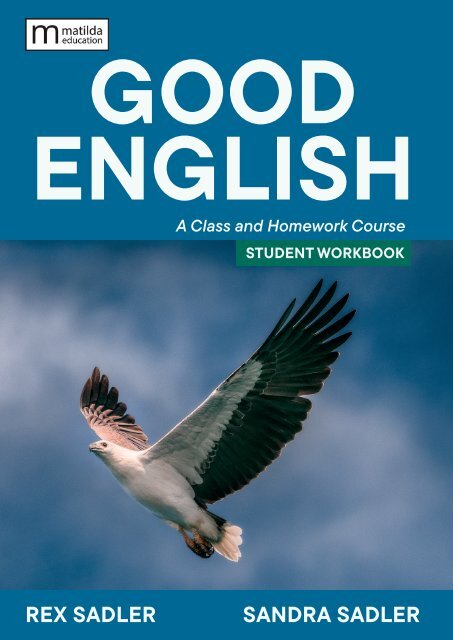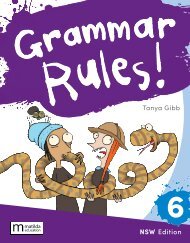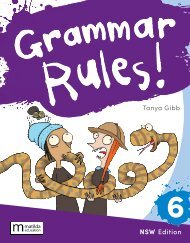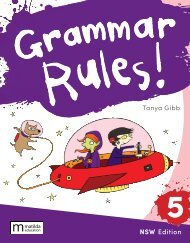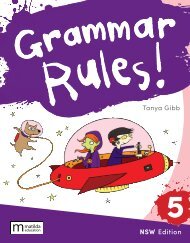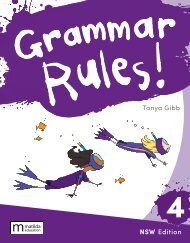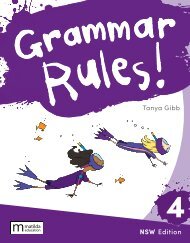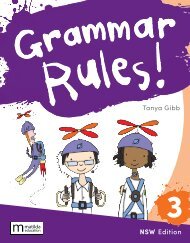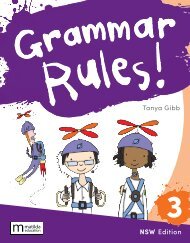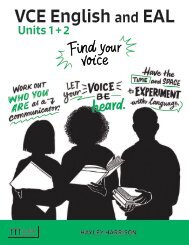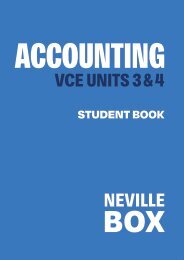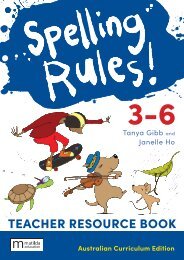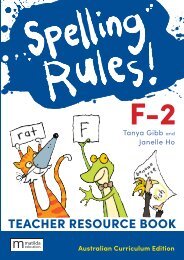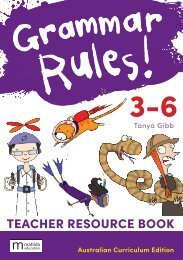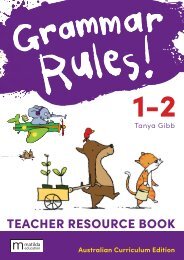Good English Student Book sample/look inside
- No tags were found...
You also want an ePaper? Increase the reach of your titles
YUMPU automatically turns print PDFs into web optimized ePapers that Google loves.
GOOD<br />
ENGLISH<br />
A Class and Homework Course<br />
STUDENT WORKBOOK<br />
REX SADLER<br />
SANDRA SADLER
GOOD<br />
ENGLISH<br />
A Class and Homework Course<br />
STUDENT WORKBOOK<br />
REX SADLER<br />
SANDRA SADLER
<strong>Good</strong> <strong>English</strong><br />
Rex Sadler<br />
Sandra Sadler<br />
Publisher: Melinda Schumann<br />
Editor: Kellyanne Martin<br />
Permissions researcher: Gillian Cardinal<br />
<strong>Book</strong> designer and typesetter: Beau Lowenstern<br />
Proofreader: Kelly Robinson<br />
Typeset in Meta Serif Pro and Fira Sans Pro<br />
Cover image: iStock/Philip Thurston<br />
This edition was published in 2024 by<br />
Matilda Education Australia,<br />
an imprint of Meanwhile Education Pty Ltd<br />
Melbourne, Australia<br />
T: 1300 277 235<br />
E: customersupport@matildaed.com.au<br />
www.matildaeducation.com.au<br />
Published in 2024 by Matilda<br />
Education Australia<br />
Copyright © Rex Sadler, Sandra Sadler, 2024<br />
The moral rights of the authors have been asserted.<br />
All rights reserved. Except under the conditions described<br />
in the Copyright Act 1968 of Australia (the Act) and<br />
subsequent amendments, no part of this publication may<br />
be reproduced, in any form or by any means, without the<br />
prior written permission of the copyright owner.<br />
Educational institutions copying any part of this<br />
book for educational purposes under the Act must be<br />
covered by a Copyright Agency Limited (CAL) licence<br />
for educational institutions and must have given a<br />
remuneration notice to CAL.<br />
These limitations include: restricting the copying to a<br />
maximum of one chapter or 10% of this book, whichever<br />
is greater. For details of the CAL licence for educational<br />
institutions, please contact:<br />
Acknowledgements<br />
The author and publisher are grateful to the following for permission to<br />
reproduce copyright material:<br />
Adobe Stock /2happy, 25 /3dsculptor, 131 /AIGen, 123 /Alexey Seafarer,<br />
18 /aloha2014, 176 /Anna Om, 29 /Bijac, 170 /Boris Riaposov, 149 /<br />
byrdyak, 46, 162 /Carlos, 11 /ChantalS, 105 /Chris Ison, 48 /Christopher<br />
Dodge, 86 /Clark, 24 /Comofoto, 156 /Dennis Jacobsen, 161 /Fesenko,<br />
118 /funstarts33, 169 /FurryFritz, 12 /galinago_media, 68 /Garnar, 17 /<br />
Gaschwald, 58 /Gorodenkoff, 133 /Halfpoint, 75 /Iakov Kalinin, 60 /Ian<br />
Scott, 39 /ihorvsn, 115 /Iisssbetha, 72 /Image Smith, 70 /IndiaPix, 163 /<br />
Javier brosch, 154 /Jose Ignacio Soto, 33 /Karlos Lomsky, 5 /Kateryna,<br />
117 /KOTO, 56 /Lightfield Studios, 159 Ljupco Smokovski, 16 /Lowell, 110<br />
/Luke, 150 /Lysander, 124 /Mark J. Barrett, 114 /Masaharu Shirosuna,<br />
51 /mindstorm, 126 /Mistervlad, 38 /Mny-Jhee, 99 /Monkey Business,<br />
130 /moofushi, 4 /Naila, 143 /Pavel Losevsky, 31 /Photology1971,<br />
27 /PicMedia, 77 /Pixelbliss, 64 /pixelrobot, 10 /preto_perola, 166 /<br />
Prostock-studio, 13 /Przemek Klos, 55 /Qualit Design, 78 /ratpack223,<br />
87 /Riko Best, 148 /robcatorres, 142 /robdthepastrychef, 82 /Robin, 81<br />
/Romario len, 125 /Sabphoto, 129 /samarpit, 41 /Savvapanf Photo (c),<br />
121 /Sean Hsu, 153 /Seventyfour, 128 /shams Faraz Amir, 44 /Shining<br />
Pro, 2 /soft_light, 65 /Sorin, 43 /Soyka, 107 /Stéphane Bidouze, 127 /<br />
StratfordProductions, 67 /Studio Romantic, 134 /Thomas Bethge,<br />
135 /Toey Meaong, 157 /tomoki1979, 108 /Tremens Productions, 122 /<br />
victorfusionart, 151 /Visualmind, 103 /vitusia, 180 /Vladimir Wrangel,<br />
136 /WavebreakmedaMicro, 119 /weerapat1003, 21 /xy033, 102; Alamy /<br />
Adam Stoltman, 36 /Album, 138 /Chris Howes/Wild Places Photography,<br />
178 /cineclassico, 155 /Flixpix, 59, 89, 113 /GRANGER - Historical Picture<br />
Archive, 168 /Landmark Media, 90, 93, 94,95, /Moviestore Collection Ltd,<br />
92, 97, 116, 174 /North Wind Picture Archives, 137 /Pictorial Press Ltd,<br />
79 /PictureLux/The Hollywood Archive, 91 /ScreenProd/Photononstop,<br />
96 /SilverScreen, 84 /Tetra Images, LLC, 120 /Wildlife GmbH, 6; Getty<br />
Images /Camerique, 7 /Hulton Archive, 49; iStockphoto /Aleutie, 146 /<br />
Alexksandar Georgiev, 54 /AWelshLad, 100 /Bulat Silvia, 1 /CharlieAJA,<br />
141 /DamianKuzdac, iv /drewsulockcreations, 132 /Ivanko_Brnjakovic,<br />
167 /keiichihiki, 172 /Leonid Andronov, 63 /master1305, 80 /michaeljung,<br />
47 /Muravin, 106 /NGvozdeva, 112 /Philip Thurston, cover /ricochet64,<br />
35 /USO, 23.<br />
Every effort has been made to identify copyright holders and obtain<br />
their permission for the use of copyright material. We actively solicit<br />
copyright holders or anyone with knowledge of copyright holders to<br />
come forward.<br />
Publication data<br />
Author: Rex Sadler, Sandra Sadler<br />
Title: <strong>Good</strong> <strong>English</strong> <strong>Student</strong> Workbook<br />
ISBN: 9780655094333<br />
Copyright Agency Limited<br />
Level 11, 66 Goulburn Street<br />
Sydney, NSW 2000<br />
Toll-free phone number (landlines only): 1800066844<br />
Telephone: (02) 9394 7600<br />
Fax (02) 9394 7601.<br />
Email: memberservices@copyright.comau<br />
Website: https://www.copyright.com.au<br />
Printed in Malaysia<br />
by Vivar Printing<br />
July-2024
Contents<br />
Part 1 Grammar 1<br />
Unit 1 What are parts of speech? 2<br />
Unit 2 What are nouns? 5<br />
Unit 3 Singular and plural nouns 9<br />
Unit 4 What are adjectives? 11<br />
Unit 5 Comparison of adjectives 13<br />
Unit 6 What are verbs? 15<br />
Unit 7 Verbs tell time 18<br />
Unit 8 Active and passive verbs 19<br />
Unit 9 Modal verbs 20<br />
Unit 10 What are participles? 22<br />
Unit 11 What are adverbs? 25<br />
Unit 12 What are pronouns? 28<br />
Unit 13 What are prepositions? 31<br />
Unit 14 What are conjunctions? 33<br />
Unit 15 What are sentences? 35<br />
Unit 16 Subject and predicate 37<br />
Unit 17 What are phrases? 39<br />
Unit 18 What are clauses? 42<br />
Part 2 Getting it right 47<br />
Unit 19 Subject–verb agreement 48<br />
Unit 20 Irregular verbs 52<br />
Unit 21 Pronoun rules 54<br />
Unit 22 Distinguishing nouns from verbs 55<br />
Unit 23 Using correct nouns and verbs 56<br />
Unit 24 Problem pairs 57<br />
Unit 25 Eliminating needless repetition 58<br />
Part 3 Words and meanings 59<br />
Unit 26 Increase your word power 60<br />
Unit 27 Shades of meaning 63<br />
Unit 28 Word families 66<br />
Unit 29 Prefixes 68<br />
Unit 30 Suffixes 70<br />
Unit 31 Synonyms 72<br />
Unit 32 Antonyms 74<br />
Unit 33 Homonyms 76<br />
Part 4 Persuasion 79<br />
Unit 34 What is a persuasive text? 80<br />
Unit 35 Speech 81<br />
Unit 36 Pamphlet 82<br />
Unit 37 Movie poster 84<br />
Unit 38 Advertisement 86<br />
Unit 39 Letter 87<br />
Part 5 Viewing movies 89<br />
Unit 40 Close-up 90<br />
Unit 41 Medium shot 91<br />
Unit 42 Long shot 92<br />
Unit 43 Extreme long shot 93<br />
Unit 44 High-angle shot 94<br />
Unit 45 Eye-level shot 95<br />
Unit 46 Low-angle shot 96<br />
Unit 47 Film poster 97<br />
GOOD ENGLISH<br />
iii
Part 6 The techniques of the poet 99<br />
Unit 48 The poet’s purpose 100<br />
Unit 49 Painting word pictures 102<br />
Unit 50 The sounds of poetry 108<br />
Part 7 Write now! 113<br />
Unit 51 I remember when … 114<br />
Unit 52 Persuasive writing 115<br />
Unit 53 Getting the reader’s attention 116<br />
Unit 54 Using details to enliven a description 117<br />
Unit 55 Creating action with verbs 118<br />
Unit 56 Setting 119<br />
Unit 57 Every picture tells a story 120<br />
Unit 58 What it feels like … 121<br />
Unit 59 Conflict 122<br />
Unit 60 Encounters with animals 123<br />
Unit 61 Eyewitness accounts 124<br />
Part 8 Spelling and vocabulary 125<br />
Unit 62 Tricky little words 126<br />
Unit 63 Persuasion 127<br />
Unit 64 It’s freezing outside 128<br />
Unit 65 Feelings and emotions 129<br />
Unit 66 Emergency 130<br />
Unit 67 Future worlds 131<br />
Unit 68 Getaway 132<br />
Unit 69 Fire and flooding rains 133<br />
Unit 70 If the price is right 134<br />
Unit 71 Increase your word power 135<br />
Unit 72 Confusing pairs 136<br />
Part 9<br />
The extraordinary<br />
<strong>English</strong> Language 137<br />
Unit 73 Everyday origins 138<br />
Unit 74 Animal word origins 142<br />
Unit 75 Latin words in <strong>English</strong> 144<br />
Unit 76 Greek words in <strong>English</strong> 147<br />
Unit 77 Words from around the world 149<br />
Unit 78 Aboriginal words in <strong>English</strong> 150<br />
Part 10 Let’s punctuate 151<br />
Unit 79 Capital letters 152<br />
Unit 80 Full stops, question marks and<br />
exclamation marks 154<br />
Unit 81 Commas and pauses 156<br />
Unit 82 Commas and lists 158<br />
Unit 83 Apostrophes to show possession 159<br />
Unit 84 Apostrophes to show contractions 160<br />
Unit 85 Apostrophe confusion 161<br />
Unit 86 Punctuating direct speech 163<br />
Unit 87 Colons introducing lists 165<br />
Unit 88 Punctuation revision 166<br />
Part 11 Enjoying literature 167<br />
Unit 89 Fables 168<br />
Unit 90 Legends 170<br />
Unit 91 Poem 172<br />
Unit 92 Novel 174<br />
Unit 93 Information brochure 176<br />
Unit 94 Novel 178<br />
iv<br />
GOOD ENGLISH
Grammar<br />
1
UNIT 1<br />
Unit 1<br />
What are parts of speech?<br />
Almost all sentences are made up of parts of speech. The simple sentence ‘My dog barks loudly’<br />
begins with the pronoun ‘my’, followed by the noun ‘dog’, the verb ‘barks’ and the adverb ‘loudly’.<br />
You can see that in a sentence, every word has a specific role to convey the meaning of the sentence.<br />
A word’s part of speech identification shows how it will work together with the other words.<br />
You will also notice when using a dictionary that the part of speech of each word is identified.<br />
In The Macquarie Junior Dictionary, the listing for the word ‘apple’ is: ‘apple, noun, a crisp round<br />
fruit with red or green skin’.<br />
Here is a short poem that gives you some idea of how helpful parts of speech can be in giving us<br />
an understanding of the structure of the <strong>English</strong> language.<br />
Parts of speech<br />
Every name is called a noun,<br />
As field and fountain, street and town.<br />
In place of nouns the pronoun stands,<br />
As he and she can clap their hands.<br />
The adjective describes a thing,<br />
As magic wand and bridal ring.<br />
The verb means action, something done—<br />
To read, to write, to jump, to run.<br />
How things are done, the adverbs tell,<br />
As quickly, slowly, badly, well.<br />
The prepositions show relation,<br />
As in the street or at the station.<br />
Conjunctions join in many ways,<br />
Sentences, words, or phrase and phrase.<br />
The interjection cries out, ‘Hark!<br />
I need an exclamation mark!’<br />
Through poetry we learn how each<br />
Of these makes up the Parts of Speech.<br />
2 GOOD ENGLISH
UNIT 1<br />
The eight parts of speech<br />
There are eight main parts of speech.<br />
Nouns Pronouns Adjectives Verbs<br />
Adverbs Prepositions Conjunctions Interjections<br />
Nouns<br />
Nouns name people, places, things, creatures, feelings or qualities.<br />
teenager Jeremy beach Greece computer elephant Olivia love<br />
Pronouns<br />
Pronouns are used in the place of nouns.<br />
I, me, my, mine, we, us, our (first person)<br />
you, your (second person)<br />
he, his, him, she, hers, her, it, its, they, their, them (third person)<br />
Adjectives<br />
Adjectives describe nouns or pronouns.<br />
delicious angry thirsty tired brown thin gigantic intelligent<br />
Verbs<br />
Verbs express all kinds of actions. They are doing, being and having words.<br />
speak investigate jump argue believe swim explain rejoice<br />
Adverbs<br />
Adverbs add extra meaning to verbs, adjectives and other adverbs. Adverbs often end<br />
in ‘-ly’.<br />
happily quickly loudly often tomorrow today very sometimes<br />
Prepositions Prepositions link a noun or pronoun to another word.<br />
by with from onto upon against beside during about for to near<br />
Conjunctions Conjunctions join words, phrases or sentences together.<br />
and but because while if although however since until<br />
Interjections Interjections express an emotion or feeling.<br />
Ah! Ouch! Hey! Oops! Oh, what a feeling!<br />
Identifying parts of speech<br />
What part of speech is each of the following words?<br />
1. happy<br />
2. peaches<br />
3. but<br />
4. eat<br />
5. because<br />
6. sleepily<br />
7. speedily<br />
8. has<br />
9. Ow!<br />
10. our<br />
11. kind<br />
12. under<br />
13. she<br />
14. into<br />
15. generous<br />
16. freedom<br />
17. Hurray!<br />
18. write<br />
GOOD ENGLISH<br />
3
UNIT 1<br />
Using parts of speech to complete sentences<br />
Select from the box the most suitable parts of speech to complete the sentences. The identification<br />
given in the brackets will help you.<br />
happiness after tasty heavily quietly her<br />
stormy zoomed through Rome Hooray! growled<br />
1. The speedboat across the lake. (verb)<br />
2. The burglar crept through the house. (adverb)<br />
3. The crowd cheered we had won the game. (conjunction)<br />
4. The hunters pursued the deer the forest. (preposition)<br />
5. was not built in a day. (noun)<br />
6. I bought a hamburger at the local shopping centre. (adjective)<br />
7. The class shouted, ‘ ’ when school finished for the holidays. (interjection)<br />
8. This morning it rained . (adverb)<br />
9. The sailors are expecting weather. (adjective)<br />
10. This is apple. (pronoun)<br />
11. There was much when the war ended. (noun)<br />
12. The dog as the stranger approached. (verb)<br />
Identifying parts of speech in sentences<br />
Identify, in the order they occur, the parts of speech of the words in heavy type.<br />
1. The bright sun rose slowly above the swimmers.<br />
2. The old horse galloped towards them.<br />
3. Don’t panic! An ambulance will be arriving soon.<br />
4. We went to the oval and watched the soccer match.<br />
5. Oops! I’ve spilled my coffee.<br />
6. The speeding car skidded on the wet road.<br />
7. The surfer ran across the sand.<br />
8. The spectators cheered loudly, but their team lost easily.<br />
9. The audience was very disappointed by the film’s ending.<br />
10. They could see the blue mountains in the distance.<br />
4 GOOD ENGLISH
Unit 2<br />
What are nouns?<br />
Nouns are naming words. They are used to name people, places, things, creatures, feelings or qualities.<br />
• People: sister, librarian, surgeon,<br />
Jason, Charlotte<br />
• Places: beach, church, school,<br />
Mt Everest, New York<br />
• Things: car, pen, television, umbrella,<br />
rain, tree<br />
• Creatures: leopard, toad, hawk,<br />
lobster, dolphin<br />
• Feelings: joy, sadness, love, anxiety,<br />
disgust, fear<br />
• Qualities: creativity, intelligence,<br />
enthusiasm, loyalty<br />
Nouns that name people<br />
Write the name of the person who:<br />
1. repairs cars<br />
2. cares for people’s teeth<br />
3. studies the stars<br />
4. mends water pipes<br />
5. rides race horses<br />
6. <strong>look</strong>s after sheep<br />
7. flies an aeroplane<br />
8. writes books<br />
9. designs buildings<br />
10. learns a trade<br />
11. sells flowers<br />
12. searches for new lands<br />
Nouns that name animals<br />
Write the names of the animals that make each of the following sounds.<br />
1. the quacking of a<br />
2. the cooing of a<br />
3. the barking of a<br />
4. the neighing of a<br />
5. the hooting of an<br />
6. the grunting of a<br />
7. the croaking of a<br />
8. the gobbling of a<br />
9. the purring of a<br />
10. the braying of a<br />
11. the trumpeting of an<br />
12. the buzzing of a<br />
GOOD ENGLISH<br />
5
UNIT 2<br />
Nouns that name places<br />
Write the nouns for the places where:<br />
1. experiments are conducted<br />
2. fruit trees are grown<br />
3. a dog is housed<br />
4. pupils are educated<br />
5. criminals are detained<br />
6. books are kept<br />
7. films are shown<br />
8. fish are cared for<br />
9. aeroplanes are kept<br />
10. cars are kept<br />
11. plays are performed<br />
12. cows are milked<br />
Nouns that name things<br />
Complete each of these expressions by inserting the name of the missing object.<br />
1. the radius of a<br />
2. the flames of a<br />
3. the mattress of a<br />
4. the spokes of a<br />
5. the rungs of a<br />
6. the petals of a<br />
7. the icing of a<br />
8. the chapter of a<br />
9. the summit of a<br />
10. the yolk of an<br />
Nouns that name qualities<br />
Write the nouns that name these qualities. The first one has been done to help you.<br />
foolishness<br />
1. A foolish man shows his .<br />
2. An honest politician values .<br />
3. A wise person speaks with .<br />
4. A lazy person displays .<br />
5. A determined student has .<br />
6. A famous actor has achieved .<br />
7. A weary traveller feels .<br />
8. A kind person shows .<br />
9. A curious student shows .<br />
10. An obedient dog shows .<br />
6 GOOD ENGLISH
UNIT 2<br />
Types of nouns<br />
There are four types of nouns.<br />
Common nouns<br />
Most nouns are common nouns. A common noun names a person, place, animal, thing, emotion or<br />
quality. Common nouns do not begin with a capital letter unless they start a sentence.<br />
girl train leopard book river orange day<br />
Proper nouns<br />
Proper nouns are used to name a specific person, place, thing or creature. They always begin with a<br />
capital letter.<br />
Jacob France Tuesday Toyota Lassie Ava<br />
Collective nouns<br />
Collective nouns are used to name a collection or group of similar people, things or creatures.<br />
flock of birds bouquet of flowers fleet of ships litter of puppies<br />
Abstract nouns<br />
Abstract nouns are used to name feelings, emotions, qualities or<br />
ideas. They are things you cannot see or touch.<br />
beauty success love bravery<br />
sadness fear anger loyalty<br />
Proper and common nouns match-up<br />
Proper nouns always begin with a capital letter. Match the proper nouns in the box with the<br />
common nouns below.<br />
London Saturn Coca-Cola Cleopatra Nile Apple<br />
Tesla Mozart Superman Vesuvius Shrek Emirates<br />
1. city<br />
2. composer<br />
3. drink<br />
4. car<br />
5. computer<br />
6. ogre<br />
7. river<br />
8. queen<br />
9. airline<br />
10. planet<br />
11. mountain<br />
12. hero<br />
GOOD ENGLISH<br />
7
UNIT 2<br />
Collective nouns in action<br />
Complete the phrases by choosing suitable collective nouns from the list. Use each collective noun<br />
once only.<br />
galaxy fleet troupe choir school battalion plague<br />
staff team crew orchestra flock pack litter<br />
pride anthology bouquet forest hail library herd<br />
1. a of trees<br />
2. an of musicians<br />
3. a of cricketers<br />
4. an of poems<br />
5. a of locusts<br />
6. a of teachers<br />
7. a of stars<br />
8. a of bullets<br />
9. a of singers<br />
10. a of wolves<br />
11. a of flowers<br />
12. a of lions<br />
13. a of sailors<br />
14. a of soldiers<br />
15. a of puppies<br />
16. a of sheep<br />
17. a of ships<br />
18. a of acrobats<br />
19. a of books<br />
20. a of fish<br />
Creating abstract nouns<br />
Change the following words into abstract nouns. For example:<br />
free – freedom<br />
1. admire<br />
2. deceive<br />
3. strong<br />
4. angry<br />
5. absent<br />
6. cruel<br />
7. sad<br />
8. curious<br />
9. proud<br />
10. favourite<br />
prosper – prosperity<br />
11. relieve<br />
12. oppose<br />
13. develop<br />
14. attract<br />
15. beautiful<br />
16. friend<br />
17. imagine<br />
18. encourage<br />
19. confuse<br />
20. superior<br />
21. satisfy<br />
22. punctual<br />
23. persuade<br />
24. moral<br />
25. just<br />
26. know<br />
27. hate<br />
28. please<br />
29. vain<br />
30. various<br />
8 GOOD ENGLISH
Unit 3<br />
Singular and plural nouns<br />
A singular noun indicates one person, place or thing. For example:<br />
boy girl child story thief<br />
A plural noun stands for two or more people, places or things.<br />
boys girls children stories thieves<br />
Rules for forming plurals<br />
1. Nouns form their plurals in a number of ways. The most common way is to simply add ‘-s’ to<br />
the singular form.<br />
poet – poets dog – dogs table – tables<br />
2. For nouns whose singulars end in ‘s’, ‘sh’, ‘ch/tch’, ‘x’ or ‘ss’, the ending ‘-es’ has to be added<br />
to form the plural.<br />
bus – buses clash – clashes match – matches fox – foxes class – classes<br />
3. Nouns that end in ‘y’ preceded by a vowel (e.g. words ending with ‘ay’, ‘ey’ or ‘oy’) form their<br />
plurals by just adding an ‘-s’.<br />
holiday – holidays donkey – donkeys boy – boys<br />
4. Nouns that end with ‘y’ preceded by a consonant form their plurals by changing the ‘y’ into<br />
an ‘i’ and adding ‘-es’.<br />
lady – ladies country – countries family – families puppy – puppies<br />
5. Nouns that end with ‘f’ form their plural either by simply adding ‘-s’ or by changing the ‘f’<br />
into ‘v’ and then adding ‘-es’.<br />
roof – roofs chief – chiefs calf – calves wife – wives<br />
6. Words ending with ‘o’ form their plurals by adding ‘-es’, ‘-s’ or sometimes either.<br />
tomato – tomatoes kilo – kilos volcano – volcanoes/volcanos<br />
7. Some nouns have the same form for the plural as for the singular.<br />
deer – deer sheep – sheep salmon – salmon aircraft – aircraft<br />
8. Some nouns have peculiar plurals that you’ll just have to learn as you meet them.<br />
foot – feet mouse – mice radius – radii child – children<br />
woman – women man – men tooth – teeth stimulus – stimuli<br />
opus – opera bacterium – bacteria crisis – crises quiz – quizzes<br />
GOOD ENGLISH<br />
9
UNIT 3<br />
Forming plurals<br />
Form the plurals of these nouns.<br />
1. brush<br />
2. valley<br />
3. diary<br />
4. piano<br />
5. child<br />
6. party<br />
7. echo<br />
8. domino<br />
9. library<br />
10. chief<br />
11. supply<br />
12. leaf<br />
13. tomato<br />
14. paper<br />
15. bus<br />
16. bicycle<br />
17. thief<br />
18. difficulty<br />
19. country<br />
20. woman<br />
21. monkey<br />
22. church<br />
23. jockey<br />
24. wolf<br />
Forming singulars<br />
Write down the singular form of these plural nouns.<br />
1. geese<br />
2. women<br />
3. cargoes<br />
4. cities<br />
5. potatoes<br />
6. princesses<br />
7. mice<br />
8. babies<br />
9. sheep<br />
10. loaves<br />
11. dresses<br />
12. tragedies<br />
13. journeys<br />
14. teeth<br />
15. peaches<br />
16. pianos<br />
17. oxen<br />
18. oases<br />
19. foxes<br />
20. volcanoes<br />
21. dictionaries<br />
22. studios<br />
23. curricula<br />
24. stimuli<br />
10 GOOD ENGLISH
Unit 4<br />
What are adjectives?<br />
Adjectives are words that add meaning to nouns. They describe people, places, things, creatures<br />
and feelings. Their main purpose is to give the audience a more graphic picture of nouns. This is<br />
shown in the following examples.<br />
• size: huge boulders<br />
• colour: a pink carnation<br />
• number: three hours<br />
• taste: an appetising dessert<br />
• place: a sandy beach<br />
• origin: a Spanish galleon<br />
• appearance: pointed ears<br />
• shape: a wide road<br />
• sound: jingling coins<br />
• direction: a westerly wind<br />
• emotion: angry words<br />
• touch: cold steel<br />
Identifying adjectives<br />
Identify all the adjectives in the following sentences.<br />
1. The pop star was driving a flash, new car.<br />
2. Among the bright coral swam little fish with quivering tails.<br />
3. The dilapidated castle appeared eerie and menacing in the mist.<br />
4. A cruel and evil witch lived in the enchanted forest.<br />
5. In the haunted house, ghostly figures vanished into thin air.<br />
6. After an arduous journey, the two exhausted explorers reached civilisation.<br />
7. A dozen porpoises, skimming through the waves, chased the old ferry across the harbour.<br />
GOOD ENGLISH<br />
11
UNIT 4<br />
Forming adjectives from the names of countries<br />
Change into adjectives the name of the countries in brackets. The first one has been done to help you.<br />
Indian<br />
1. curry (India)<br />
2. choir (Wales)<br />
3. flags (Tibet)<br />
4. cars (Japan)<br />
5. cuisine (France)<br />
6. beer (Germany)<br />
7. silk (China)<br />
8. soldiers (America)<br />
9. music (Cuba)<br />
10. butter (Denmark)<br />
11. monarch (England)<br />
12. guitars (Spain)<br />
Forming adjectives<br />
Form adjectives from the words in brackets to complete the phrases below. The first one has been<br />
done to help you.<br />
comfortable<br />
1. a chair (comfort)<br />
2. a fire (destroy)<br />
3. an athlete (energy)<br />
4. an moment (anxiety)<br />
5. a army (victory)<br />
6. an car (expense)<br />
7. a rescuer (courage)<br />
8. a sunset (gold)<br />
9. a decision (disaster)<br />
10. a flower (beauty)<br />
11. a saw (circle)<br />
12. a decision (fortune)<br />
13. a eruption (volcano)<br />
14. a child (mischief)<br />
15. a parent (pride)<br />
16. a parrot (talk)<br />
Matching up adjectives and nouns<br />
Choose the most suitable adjective from the list for each noun below. Use each adjective once only.<br />
sandy sparkling delicious fatal woollen poisonous<br />
meowing torrential villainous sharp stationary screeching<br />
1. a meal<br />
2. a coat<br />
3. a pirate<br />
4. a snake<br />
5. a knife<br />
6. a beach<br />
7. a seagull<br />
8. a car<br />
9. diamonds<br />
10. rain<br />
11. a accident<br />
12. a cat<br />
12 GOOD ENGLISH
Unit 5<br />
Comparison of adjectives<br />
Look at these three sentences:<br />
Andrew is tall.<br />
Andrew is taller than Ali.<br />
Andrew is the tallest boy in the class.<br />
The first sentence is a simple statement about one person.<br />
The second sentence makes a comparison between two<br />
people. The third sentence compares more than two<br />
people.<br />
Thus, adjectives have three degrees of comparison:<br />
• positive (one) tall<br />
• comparative (two) taller<br />
• superlative (more than two) tallest<br />
Rules for forming comparatives and superlatives<br />
1. The comparative is formed by adding ‘er’ or ‘r’.<br />
2. The superlative is formed by adding ‘est’ or ‘st’.<br />
old – older – oldest<br />
late – later – latest<br />
great – greater – greatest<br />
large – larger – largest<br />
3. When the positive form ends with ‘y’ preceded by a consonant, the ‘y’ is changed to ‘i’ before<br />
adding ‘er’ or ‘est’.<br />
angry – angrier – angriest<br />
lonely – lonelier – loneliest<br />
4. When the positive form has only one syllable, and that syllable ends with a consonant<br />
preceded by a singular vowel, the consonant is doubled before the ‘er’ or ‘est’ is added.<br />
sad – sadder – saddest<br />
slim – slimmer – slimmest<br />
5. When adjectives have more than two syllables, their comparative and superlative degrees are<br />
usually formed by the addition of the words ‘more’ or ‘most’.<br />
dangerous – more dangerous – most dangerous<br />
comfortable – more comfortable – most comfortable<br />
Some adjectives do not follow these rules. You should learn the exceptions shown in the<br />
following table.<br />
GOOD ENGLISH<br />
13
UNIT 5<br />
Positive Comparative Superlative<br />
good better best<br />
many more most<br />
little less least<br />
bad worse worst<br />
much more most<br />
Table of comparisons<br />
Complete the following table. The first row has been done to help you.<br />
Positive Comparative Superlative<br />
sweet sweeter sweetest<br />
easy<br />
beautiful<br />
good<br />
pretty<br />
efficient<br />
bad<br />
noisy<br />
thin<br />
cautious<br />
angry<br />
Completing the comparisons<br />
Correctly insert the positive, comparative or superlative forms of each of the missing adjectives.<br />
1. Big is to as is to smaller.<br />
2. is to funniest as happier is to .<br />
3. <strong>Good</strong> is to as is to worse.<br />
4. Rich is to as is to poorer.<br />
5. is to sweet as most sour is to .<br />
6. Faster is to as is to slowest.<br />
7. is to easiest as lucky is to .<br />
8. is to drier as wet is to .<br />
14 GOOD ENGLISH
Unit 6<br />
What are verbs?<br />
Verbs express action. They are doing, being, feeling and having words. Verbs can tell us what is<br />
happening or what has happened. Every sentence must contain at least one verb. A verb can be just<br />
one word or it can be a number of words (a compound verb). Here are some of the types of verbs you<br />
regularly encounter:<br />
• Action verbs: run, jump, eat, build, dance, arrive, swim, study<br />
Liam is working. They enjoy movies. We have returned.<br />
• Saying verbs: speak, announce, scream, laugh, cry, argue, moan, cheer<br />
We cheered. Emma is whispering. I will announce the winner.<br />
• Thinking and feeling verbs: believe, wonder, imagine, suffer, love, remember<br />
Noah knew the answer. I was thinking. We all had agreed.<br />
• Being and having verbs: am, is, are, was, be, being, been, has, had, have<br />
I am a student. Mia has the books. You are late.<br />
Verbs are very important in sentences. Look at the verbs the author Mary Shelley has used to create<br />
action in this scene in her novel Frankenstein. They are shown in heavy type.<br />
Frankenstein’s monster<br />
I <strong>look</strong>ed at the wretch. The monster I had created glared back at me. His jaws opened.<br />
Vague sounds came forth. He lifted a withered hand. Horrified, I rushed away. Now I am<br />
trembling downstairs.<br />
Identifying verbs<br />
from Frankenstein by Mary Shelley<br />
Write the verbs from each of the following sentences. The first one has been done to help you.<br />
1. The iPhone that I purchased online has arrived.<br />
purchased, has arrived<br />
2. The travellers believed that they would reach their destination before nightfall.<br />
3. It was raining so heavily that the golfers decided that they should abandon their game.<br />
4. Many students are arriving late to school because their buses were delayed by heavy traffic.<br />
GOOD ENGLISH<br />
15
UNIT 6<br />
5. After a series of victories in Britain, Julius Caesar said, ‘I came, I saw, I conquered’.<br />
6. When it was launched, the rocket soared through space towards the moon.<br />
7. The river overflowed its banks and most of the townspeople were evacuated.<br />
8. Before the storm came, the lightning flashed and the thunder rumbled loudly.<br />
9. In the farmyard, the hens were cackling and the chickens were cheeping.<br />
10. The two kookaburras laughed loudly while they perched in the old gum tree.<br />
11. It was snowing as the mountaineers reached the summit.<br />
Forming verbs<br />
Change the words in brackets to form past tense verbs to complete these sentences. The first one has<br />
been done to help you.<br />
simplified<br />
1. Our maths teacher the equation. (simple)<br />
2. The council to widen the old road. (decision)<br />
3. The engineers the bridge with steel girders. (strong)<br />
4. A gas container during the fire. (explosion)<br />
5. The students a very interesting novel to read. (choice)<br />
6. The farmer the fields. (fertile)<br />
7. The carpenter his tools. (sharp)<br />
8. The poet the beautiful scene. (description)<br />
9. The politician to a noisy audience. (speech)<br />
10. The pupils for their exam. (study)<br />
11. The economist the rising rate of inflation. (criticism)<br />
16 GOOD ENGLISH
UNIT 6<br />
12. The guests to leave the hotel. (decision)<br />
13. The builders the playground during the holidays. (large)<br />
14. The new lights up the classroom. (bright)<br />
15. The suspect he had not committed the crime. (proof)<br />
Using better verbs<br />
In your writing, try to use the best verbs you can. From the list below, select a better verb to replace<br />
‘walk’, ‘walks’ or ‘walked’ in each of the following sentences and write it in the space provided. The<br />
first letter has been given to help you.<br />
trudges limps shuffled strides waddle<br />
prowled plod paces toddled march<br />
1. The lion walked through the forest. It p .<br />
2. The ducks walk down to the pond. They w .<br />
3. The horses walk slowly uphill. They p .<br />
4. The tiger walks to and fro in its cage. It p .<br />
5. The weary labourer walks home. He t .<br />
6. The soldiers walk in time to the band. They m .<br />
7. The baby walked to its mother. She t .<br />
8. The principal walks up to the microphone. She s .<br />
9. The injured runner walks from the field. She l .<br />
10. The old man walked around in slippers. He s .<br />
GOOD ENGLISH<br />
17
UNIT 7<br />
Unit 7<br />
Verbs tell time<br />
Verbs not only create the action in a sentence, they also tell the time when the action occurred. This<br />
is known as the ‘tense’ of a verb. Look at the following sentences that show how verbs are used to<br />
indicate time.<br />
• Present tense The lesson begins. The teacher is speaking. The students are listening.<br />
• Future tense The whales will surface soon. The tourists will be taking photos.<br />
• Past tense The runner crossed the line. She had won. The crowd was cheering.<br />
There are three tenses a verb can have. They can be present, future or past tense.<br />
• Present tense I talk. I am talking.<br />
• Future tense I will/shall talk. I will/shall be talking.<br />
• Past tense I talked. I have talked. I have been talking.<br />
I was talking. I had talked. I had been talking.<br />
Choosing the correct tense<br />
Select verbs from the box to complete each of the following sentences. The tense indicated in the<br />
brackets at the end of each sentence will help to guide you.<br />
will screen raced am learning is being adopted predicts landed<br />
are watching will be replaced attended will arrive was speeding will be sailing<br />
1. At the moment, I Japanese. (present tense)<br />
2. The bushfire towards the old house. (past tense)<br />
3. The weather forecast rain for tomorrow. (present tense)<br />
4. A large number of young people the concert yesterday. (past tense)<br />
5. The stray dog by our neighbour. (present tense)<br />
6. Their old car soon. (future tense)<br />
7. The ambulance towards the hospital. (past tense)<br />
8. Tomorrow their relatives from overseas.<br />
(future tense)<br />
9. We a documentary about scientific discoveries.<br />
(present tense)<br />
10. Humans first on the moon in 1969. (past tense)<br />
11. Next week, cinemas a new Star Wars movie. (future tense)<br />
12. The new super yacht into the harbour tomorrow. (future tense)<br />
18 GOOD ENGLISH


